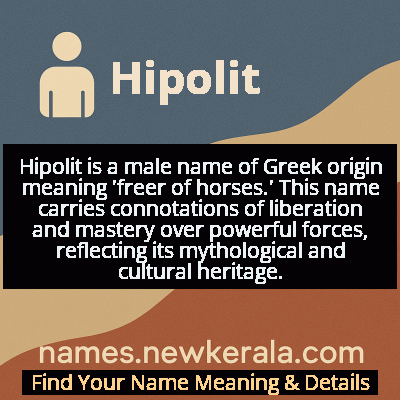Hipolit Name Meaning & Details
Origin, Popularity, Numerology Analysis & Name Meaning of Hipolit
Discover the origin, meaning, and cultural significance of the name HIPOLIT. Delve into its historical roots and explore the lasting impact it has had on communities and traditions.
Name
Hipolit
Gender
Male
Origin
Greek
Lucky Number
8
Meaning of the Name - Hipolit
Hipolit is a male name of Greek origin meaning 'freer of horses.' This name carries connotations of liberation and mastery over powerful forces, reflecting its mythological and cultural heritage.
Hipolit - Complete Numerology Analysis
Your Numerology Number
Based on Pythagorean Numerology System
Ruling Planet
Saturn
Positive Nature
Ambitious, efficient, realistic, and authoritative.
Negative Traits
Materialistic, stressed, confrontational, and can be overly ambitious.
Lucky Colours
Dark blue, black.
Lucky Days
Saturday.
Lucky Stones
Blue sapphire, amethyst.
Harmony Numbers
2, 4, 6.
Best Suited Professions
Business leaders, managers, financial services, law enforcement.
What People Like About You
Leadership, determination, organizational skills.
Famous People Named Hipolit
Hippolytus of Rome
Theologian and Antipope
Important early Christian writer and theologian who produced significant works on heresies and church order
Hipolit Cegielski
Industrialist and Philologist
Polish businessman, social activist, and philologist who founded the H. Cegielski - Poznań manufacturing company
Hipolit Wawelberg
Banker and Philanthropist
Polish banker and philanthropist who founded the Warsaw Polytechnic and supported numerous educational initiatives
Hipolit Mejłer
Military Officer
Polish general who fought in the November Uprising and served in the Russian Imperial Army
Name Variations & International Equivalents
Click on blue names to explore their detailed meanings. Gray names with will be available soon.
Cultural & Historical Significance
In Christian history, Saint Hippolytus of Rome emerged as a prominent 3rd-century theologian and martyr, contributing important early Christian writings and establishing the name within religious contexts. The name found particular resonance in Polish culture during the 19th century, where it became associated with prominent intellectuals, industrialists, and national activists. Figures like Hipolit Cegielski embodied the ideal of the enlightened entrepreneur who combined business success with patriotic commitment, making the name symbolic of Polish intellectual and economic development during the Partitions era.
Extended Personality Analysis
Individuals bearing the name Hipolit are typically characterized by their intellectual depth, strong principles, and reserved demeanor. They often possess a methodical approach to life and prefer structured environments where they can apply their analytical skills. Their moral compass tends to be well-defined and unwavering, reflecting the mythological Hippolytus's commitment to his ideals despite personal cost. This combination of intellectual rigor and ethical certainty makes them natural leaders in academic, technical, or professional settings.
While Hipolits may appear distant or formal in social situations, this often masks a deep capacity for loyalty and commitment to those they value. They form relationships carefully but maintain them with remarkable steadfastness. Their reserved nature should not be mistaken for lack of passion; rather, they channel their emotions into their work and principles. The historical association with scholars and industrialists reinforces traits of perseverance, attention to detail, and a drive for excellence that often manifests in their professional and personal pursuits.
Modern Usage & Popularity
In contemporary naming practices, Hipolit maintains a niche presence primarily within Polish-speaking communities, where it is valued for its traditional roots and intellectual connotations. The name has experienced a modest revival in Poland as part of the broader trend toward rediscovering historical names, though it remains outside the mainstream popularity charts. Its usage is often motivated by family tradition or parents seeking a name with cultural depth and sophistication. Outside Poland, the name is exceptionally rare, with most non-Polish speakers preferring international variants like Hippolytus or Ippolito. The name's association with 19th-century Polish intellectuals and industrialists gives it an air of educated refinement that appeals to parents valuing academic achievement and cultural heritage over contemporary trends.
Symbolic & Spiritual Meanings
Symbolically, Hipolit embodies the complex interplay between freedom and restraint, passion and principle. The literal meaning 'freer of horses' represents mastery over powerful, untamed forces—horses symbolizing raw energy, passion, and natural power that must be both liberated and controlled. This duality extends to the mythological associations, where Hippolytus's devotion to chastity and Artemis contrasts with the destructive passions of Phaedra. The name thus symbolizes the eternal human struggle between earthly desires and higher ideals, between natural impulses and disciplined virtue. In a broader cultural context, Hipolit represents intellectual liberation, moral integrity, and the tragic nobility that can accompany unwavering commitment to principles. These symbolic layers make the name particularly resonant for those who value depth of character and the complex interplay of human virtues and limitations.

